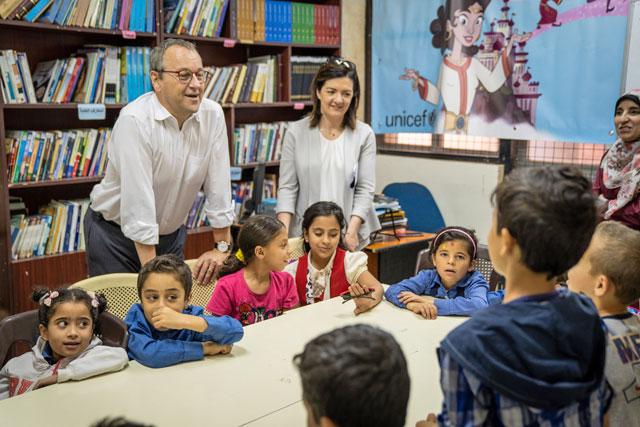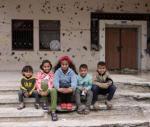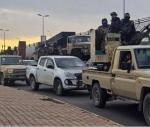You are here
UNICEF slashes services to Syrian refugees due to shortfall
By Ana V. Ibáñez Prieto - Sep 08,2018 - Last updated at Sep 08,2018

In this undated photo, Syrian refugee children are seen at a school. UNICEF has stopped a cash assistance programme to these children as a result of dwindling funding (Photo courtesy of UNICEF)
AMMAN — UNICEF Jordan will reduce the scale and scope of several of its education programmes for Syrian refugee children due to insufficient international support, the UN agency announced in the German city of Cologne on Friday.
As a result of a funding gap of $8.6 million, only 10,000 Syrian refugee children out of a total of 55,000 eligible children from unprivileged families will continue to receive financial support from UNICEF to cover educational expenses such as school material or uniforms, while another 2,500 students residing in remote settlements will suffer from the lack of transportation to and from school.
The shortage of funds may also force the UN agency to shut down 100 of its Makani (“My Space” in Arabic) centres, which provide learning opportunities, psychosocial support and life skills training for children out of the formal education system.
Christian Schneider, CEO of UNICEF Germany, expressed his fear that “more refugee children in Jordan will continue to drop out of school and fall victims to child labour or early marriage”, stressing that “for the children and their families, education means hope — especially in their troubled situation”.
In response to the crisis, UNICEF Germany has transferred a total of 500,000 euros in emergency aid, calling on stakeholders to come forward with further donations.
“Our contribution alone cannot secure the continuation of all UNICEF educational programmes,” Schneider said, calling on the international community to continue to provide assistance.
A total of 130,000 Syrian refugee children in Jordan were enrolled in schools across refugee camps and host communities in 2017 according to UNICEF Jordan representative, Robert Jenkins, who noted that the number of Syrian children enrolled in the UN agency’s catch-up and dropout programmes in 2017 reached 5,600, while the number of Syrian children enrolled in KG2 surpassed 3,000.
However, about 31 per cent of an estimated 233,000 school aged Syrian refugee children in Jordan were still out of school in April this year, according to data provided by UNICEF.
“Vulnerable children will be negatively affected if the trend of drop in aid continues, and already rising rates of child labour and early marriages among children will continue to grow as families are going through tough economic conditions,” Jenkins said during an interview with The Jordan Times in January, commenting on the UN agency’s budget reduction by a 25 per cent for the present year.
“It is absolutely critical that we maintain the level and scope of our programmes, or in the end, children will be negatively affected — That is what is keeping me up at night, and we are trying to do all we can to continue to engage with our key donors and the international community and stress on the need to sustain assistance to Jordan,” the official added.
“Education is critical for Syrian refugee children to pursue a life with less poverty, better health and an increased ability to take their future into their own hands and rebuild Syria when peace returns,” UNICEF Jordan communication specialist, Miraj Pradhan, told The Jordan Times on Wednesday, lamenting that “due to funding shortfalls, UNICEF has been forced to leave out 45,000 of the most vulnerable Syrian refugee children in Jordan from its Hajati cash assistance programme in the new school year”.
“Despite the difficult funding situation, we will continue to work with donors, the Government of Jordan and our partners to deliver essential services in a cost-effective and sustainable way, while supporting the strengthening of national systems for the benefit of all vulnerable children in Jordan, irrespective of their nationality or status,” Pradhan added.
In a joint press conference held by Regional Refugee and Resilience Plan (3RP) co-conveners in May, UNICEF Regional Director Geert Cappelaere warned that the agency may also be forced to cut its services in other countries in the region such as Lebanon and Turkey, appealing for a total of $100 million in donations in order to continue its activities in all host countries impacted by the Syrian crisis.
“Our approach is not to serve one group but all vulnerable children,” Cappelaere stressed, expressing UNICEF’s aim to “ensure that all public service systems are strengthened in order to continue satisfying the needs of both refugees and the local population”.
Related Articles
AMMAN — UNICEF Jordan has recently resumed its programme providing transportation to school for over 2,000 refugee and vulnerable children r
AMMAN — UNICEF’s Regional Director Geert Cappelaere expressed his gratitude to Jordan in affirming the rights of all children at the end of
AMMAN — UNICEF is committed to enabling all children on Jordan’s soil to access education and learning, but both the Jordanian government an

















